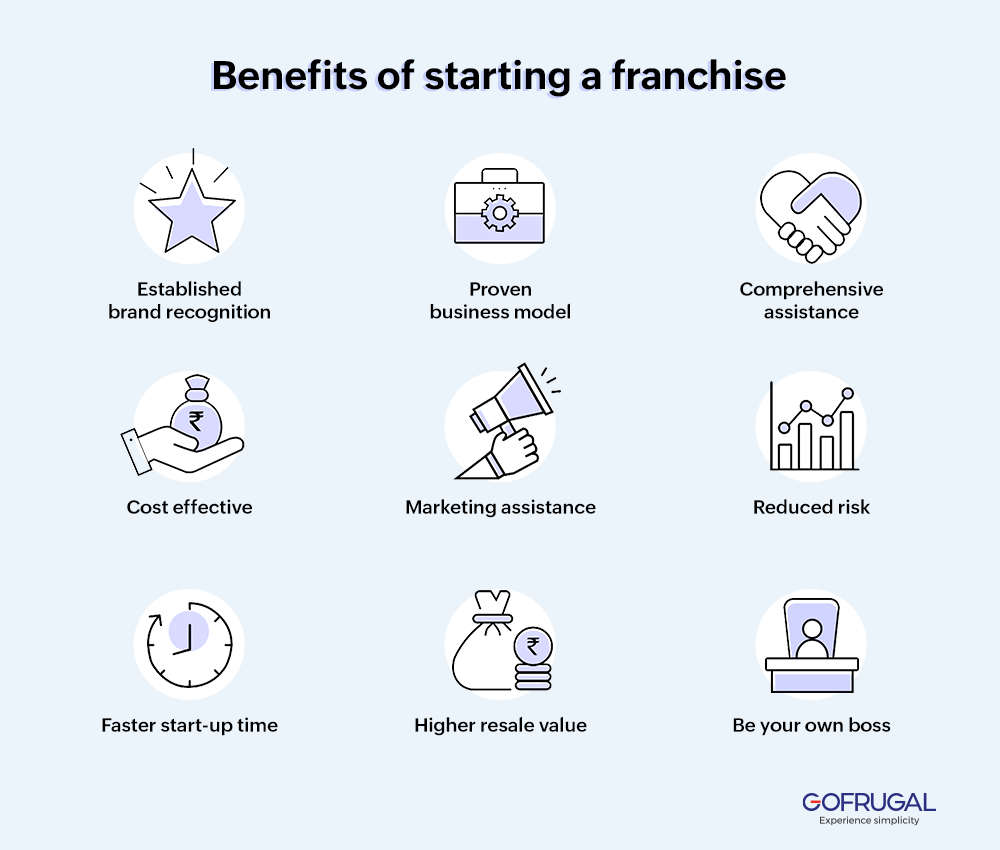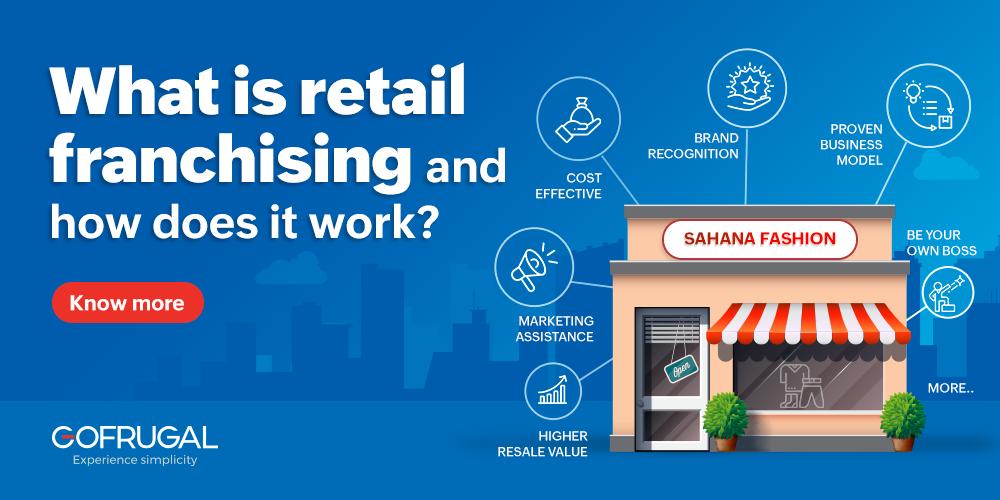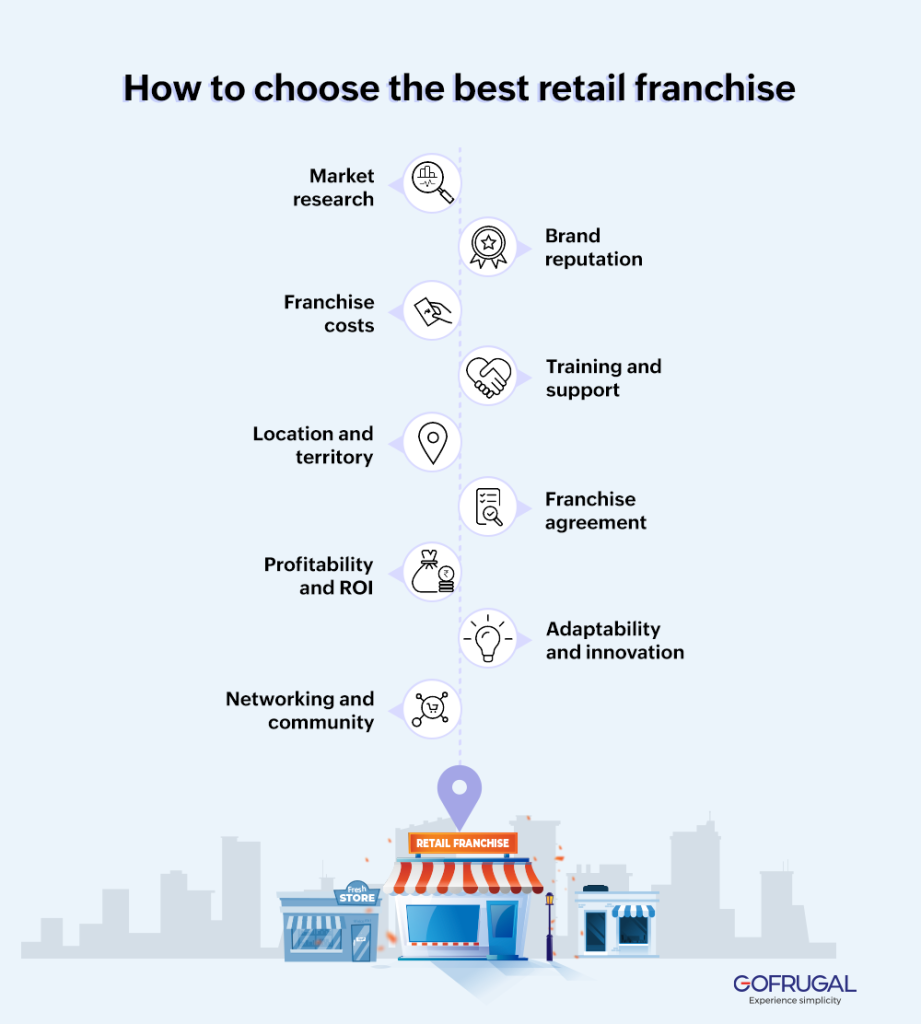Imagine you have an eye for fashion and a dream of owning a clothing store that stands out, but the thought of starting from scratch—finding suppliers, creating a brand, and setting up shop—feels like an uphill battle. That’s where retail franchising steps in. It’s like partnering with a renowned clothing brand. You get to use their style, their designs, and their methods to start your store. It’s like opening a boutique that carries a famous designer’s line but with your touch.
Contents
- What is retail franchising?
- Benefits of starting a franchise
- Retail franchising models
- How to get started with retail franchising
- Checklist before signing a franchise agreement
- How do retail franchises work?
- How to choose the best retail franchise
- Key factors for successful retail franchising
- Role of POS software in retail franchising
What is retail franchising?
Retail franchising means partnering with a well-known brand to run your own store using their proven methods and support systems. This type of business, called a retail franchise, lets you use the brand’s name and follow their guidelines for success. Retail franchise management involves sticking to the brand's standards and benefiting from their training and marketing help. In short, franchising in retail management helps you run a successful store with ongoing support from a trusted brand.
Benefits of starting a franchise

Established brand recognition: Jumpstart your business with immediate trust and familiarity among customers. Starting with a recognized brand gives you a head start in attracting and retaining clientele in the retail franchising world.
Proven business model: Benefit from a pretested blueprint for success. Franchises provide a roadmap based on what works, significantly reducing the trial-and-error phase of starting a new business. This highlights the essence of retail franchising meaning.
Training and ongoing support: Receive comprehensive training and continuous assistance from the franchisor. This guidance covers operational aspects, marketing strategies, and troubleshooting, ensuring you’re well-equipped for success in retail franchise management.
Economies of scale: Access better pricing, resources, and suppliers due to the collective buying power of the franchise network. This advantage allows you to operate more cost-effectively compared to individual businesses.
Marketing assistance: Tap into national or regional marketing campaigns the franchisor runs. This support helps you reach a wider audience without bearing the entire advertising cost, driving more traffic to your store. Staying ahead in the market without heavy investment in research and development is a key benefit of franchising in retail management.
Reduced risk: Retail franchising typically involves lower failure rates compared to independent startups. The proven track record and support from the franchisor minimize the inherent risks of entrepreneurship.
Faster start–up time: Benefit from a streamlined process thanks to the franchisor’s established systems and procedures. This expedites the time it takes to open and operate your store, making it a practical retail franchising example.
Exit strategy and resale value: Enjoy a potentially higher resale value and a structured market for selling your business. Franchises often have a more defined resale process, making it easier to exit when needed.
Be your own boss: Running a retail franchise lets you be the boss but with a lot of help and knowledge from the franchise. You still work hard, but you get to choose your schedule and have more control over your career. It’s like having your own business but with less risk.
Retail franchising models
Retail franchising offers various models for entrepreneurs to run their own stores under established brands, each with unique benefits and responsibilities. Understanding these models provides insight into how retail franchise management can lead to success in the franchise retail industry.
Unit franchise model: This is like opening your own standalone store using the brand and systems of a larger company. You run the show, but you’re part of a bigger network. It’s a bit like owning a single, independent coffee shop that’s part of a renowned chain.
Master franchise model: Here, you become a mini-franchisor. You’re not just opening one store; you’re responsible for developing an entire territory. You can sell unit franchises within this territory and help these owners set up and run their stores. It’s akin to owning multiple coffee shops across a region.
Manufacturer retail franchise model: This involves selling products of a particular brand. It’s like having a dedicated corner in your shop for a famous coffee brand’s products. You’re not fully under their umbrella, but you benefit from their established reputation, which is a unique aspect of franchise retail.
Conversion franchise model: This involves converting an existing independent business into a franchise of a larger brand. The business retains its identity but operates under the umbrella of the franchise, gaining access to the brand, systems, and support. It’s like allowing a local cafe to become part of a well-known coffee chain while keeping its unique flavour and style.
Multi-unit franchise model: In the multi-unit franchise model, owners manage multiple outlets of the same brand within a specified area. It’s like overseeing several coffee shops across a city under the same brand, which requires efficient retail franchise management.
Area development franchise model: The area development franchise model grants an individual or entity the right to open and operate multiple units within a specific geographical area. It’s similar to being given the keys to expand a brand across a region, taking charge of growth and establishment.
How to get started with retail franchising
Starting a retail business, whether it’s a retail franchise or an independent venture, demands careful planning and consideration.
1. Discover your passion: Think about the type of retail business that aligns with your skills and interests. Whether it’s food, clothing, or furniture, understanding your strengths is like finding the perfect canvas for your masterpiece in retail franchising.
2. Analyze local demand: To understand what businesses thrive in the area, study the local market. Adapting to the climate, culture, and preferences of your community is crucial. It’s like selecting the right colours for your canvas—a blend that resonates with your audience, making it a successful retail franchise example.
3. Assess financial capacity: Determine your investment capacity. This helps align your ambitions with reality. Consider not just franchise fees but also costs for store setup, inventory, staffing, rent, and other essentials.
4. Seek guidance from experts: Consulting legal and financial advisors is like having wise mentors guiding you through rough terrain. They help you navigate complex terms in the agreement and ensure you’re making a wise investment. It’s like having a seasoned traveller showing you the best routes to take in franchising in retail management.
5. Research franchise opportunities: Explore databases of franchise opportunities online. These platforms offer insights into initial investment requirements, operational costs, the franchise’s history, and its fit within the retail sector. Think of it as browsing through a gallery of potential artworks to find the perfect fit for your vision.
6. Plan your path: Create a solid business plan to plot a course for your journey. Define your goals, strategies, and timelines. This roadmap keeps you focused and on track throughout your retail franchising expedition.
7. Ready, set, go: Starting a retail franchise involves finding the sweet spot between your passion, local demand, and financial capacity. It’s about identifying the canvas that resonates with your interests, aligns with community needs, and fits within your budget.
Checklist before signing a franchise agreement
Before signing a retail franchise agreement, it's essential to thoroughly understand the terms and ensure you're prepared for the commitment. This checklist highlights key aspects of retail franchise management.
- Read the paperwork carefully: Understand all the rules and costs in the papers they give you.
- Check your money: Make sure you can afford everything they’re asking for.
- Talk to other owners: Ask people who already own this franchise about their experiences.
- Know your area: Understand where your shop will be and if others can open nearby.
- Get legal help: Ask a lawyer to look at the agreement to make sure it’s fair.
- Ask about help and learning: Check what support the company will give you to run the shop.
- Research what you need to do: Understand what you have to sell and how much you need to make to be successful.
- See how to stop: Find out how you can leave, if you need to, and what happens if you want to sell the shop.
- Think about the brand: Check if people like the brand and if it’s popular.
- Listen to your feelings: If something doesn’t seem right, ask more questions before you agree.
How do retail franchises work?
Retail franchising allows entrepreneurs to partner with established brands, using their names, products, and methods to run their own stores.
Partnership setup: When someone wants to start a store but doesn’t want to create a brand from scratch, they team up with an existing brand through retail franchising.
Brand sharing: The store owner (franchisee) uses the brand’s name, products, and methods. People trust the brand, so they’re likely to visit the store. This is a key retail franchising example.
Following the rules: The store owner follows rules set by the brand (franchisor). These rules keep things consistent across all stores. It’s like a recipe—everyone follows it to make the same dish taste great everywhere, which is essential in retail franchise management.
Support system: The brand helps the store owner with training, marketing, and sometimes finding the right location. It’s like having a coach guiding you through the business game.
Business growth: As the store grows, the franchisee pays a part of their sales or a fixed fee to the brand. This helps the brand grow, too.
Win-win situation: Both the brand and the store owner benefit. The brand expands without opening every store, and the store owner gets a trusted name and support to run their business. This mutual benefit is a hallmark of franchise retail.
How to choose the best retail franchise
Market research: Understanding the market’s demands and trends is crucial. Analyzing consumer behaviour, preferences, and local market gaps helps identify sectors with high growth potential, which is essential in retail franchising.
Brand reputation: While not mentioning specific brands, considering the reputation and reliability of the franchisor is vital. Opt for a franchise with a strong track record, robust support systems, and a proven business model.
Franchise costs: Assessing initial investment requirements, including franchise fees, setup costs, and ongoing royalties, is key. Ensure these costs align with your budget and financial capacity to ensure successful retail franchise management.
Training and support: Evaluate the training and ongoing support provided by the franchisor. A retail franchise offering comprehensive training programs, operational support, and marketing assistance enhances the chances of success.
Location and territory: Consider the territory or location rights offered by the franchise. Ensure it aligns with your business goals and allows for exclusivity or territorial rights within a suitable area. This is critical in franchise retail.
Franchise agreement: Carefully review the franchise agreement, seeking legal advice if necessary. Understand the terms, obligations, restrictions, and rights to make an informed decision.
Profitability and ROI: Assess the franchise’s potential for profitability. Analyze the average return on investment (ROI) and understand the expected timeline for profitability.
Adaptability and innovation: Look for franchises that encourage innovation and allow some degree of adaptability. Being able to customize offerings to local tastes while adhering to the brand’s principles can be advantageous in retail franchising.
Networking and community: Consider the network and community offered by the franchisor. A supportive network of fellow franchisees can offer insights, guidance, and a sense of belonging, enhancing your experience in retail franchise management.
Key factors for successful retail franchising
- Brand consistency: Make sure all stores look and feel the same. This helps customers know and trust the brand wherever they shop.
- Smooth store operations: Running the store smoothly, from stocking shelves to helping customers, is vital for a successful business.
- Customer-centric approach: Put customers first by understanding what they want and giving them great service. Happy customers keep coming back.
- Support from partners: Good teamwork between the brand and the store owner, with guidance and help, helps the store do well.
- Local adaptation: Change products or services a bit to fit what people in the area like. It helps the store connect better with local customers.
- Strategic growth: Thinking smartly about growing the business, much like planning how to make the store better, sets things up for long-term success.
Role of POS software in retail franchising
In retail franchising, Gofrugal’s suite of POS software, including billing software, inventory management, CRM, smart reports, and their AI/ML-based autonomous reordering solution, The Eye, stands as a cornerstone in commerce. These tools streamline sales processes by acting as efficient cashiers, ensuring quick and accurate transactions, which is crucial in retail franchise management. They also manage inventory smartly, alerting you when stocks run low and facilitating seamless reordering.
With CRM capabilities, Gofrugal’s system organizes and utilizes customer data, enabling personalized experiences and loyalty rewards. The Eye, with its AI/ML-based autonomous reordering, ensures accurate and profitable purchases, guaranteeing seamless cash flow with minimal time and effort. This is a key retail franchising example of how technology supports business growth. Moreover, these tools generate data-driven insights, functioning as valuable advisors, and showcasing popular products, sales trends, and peak periods, empowering informed decision-making for successful retail strategies.
Conclusion
As we wrap up our exploration of retail franchising, think of it like painting a picture. It’s about taking a dream and turning it into a reality. Franchising is like getting a head start by partnering with a big brand. It’s about using their style, methods, and support to create your own successful store. Remember, retail franchising isn’t just about business; it’s about community, support, and making your dreams come alive. Whether it’s a familiar brand’s name above your door or the ease of using tools like Gofrugal’s POS software, this journey offers a canvas of opportunities for entrepreneurs. So, take the knowledge, seize the support, and paint your future in the colourful world of retail franchising!




